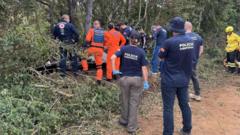The North Korean regime is eyeing an upswing in tourism with the opening of a newly completed beach resort, even as international travel remains fraught with challenges due to ongoing sanctions and past pandemic restrictions.
North Korea Unveils Ambitious Beach Resort to Revitalize Tourism Industry

North Korea Unveils Ambitious Beach Resort to Revitalize Tourism Industry
In a bid to boost tourism, North Korea is set to launch the Wonsan Kalma Coastal Tourist Zone on July 1, catering primarily to domestic visitors initially, while foreign access remains uncertain.
North Korea is making headlines for launching a beach resort that its leader, Kim Jong Un, envisions as a cornerstone for revitalizing the country’s tourism sector. The Wonsan Kalma Coastal Tourist Zone on the eastern coast is set to officially open to local tourists on July 1, six years later than its initial completion target. While the resort will initially cater to domestic visitors, the timeline for welcoming international guests remains unclear.
The North Korean leader has personal connections to Wonsan, having grown up in the area where many elite citizens possess private residences, and he seeks to pivot the town’s historical narrative from missile testing to tourism. State media, the Korean Central News Agency (KCNA), touts the resort’s capacity to accommodate up to 20,000 guests and promises various amenities, including hotels, restaurants, shopping outlets, and a water park, although these claims are yet to be independently verified.
Under harsh international sanctions for its nuclear ambitions, North Korea is one of the world's most impoverished nations, channeling a multitude of resources into its military and propaganda efforts rather than the welfare of its citizenry. Analysts suggest that promoting tourism is a strategic way for the isolated regime to generate additional revenue, particularly through visitors from China and Russia, countries with which North Korea has maintained amicable ties for decades. According to Rowan Beard, co-founder of Young Pioneer Tours, while the potential of Wonsan may signal a future shift in tourism policy, it does not imply an immediate opening to international travelers.
Tourism effectively ground to a halt during the COVID-19 pandemic, leading to the closure of North Korea's borders in early 2020. It wasn't until mid-2023 that the country began to ease travel restrictions, including welcoming Russian nationals back a year later. In February, tourists from several Western nations including the UK and Australia crossed into the country from China, but this influx was short-lived as tours were halted shortly thereafter without official explanation.
Current skepticism from tour agencies about the allure of Wonsan for foreign visitors is apparent. Some experts believe that attractions like Pyongyang, the Demilitarized Zone (DMZ), and other significant sites tied to the communist regime remain the primary draws for international tourists. Yet, others voice that the uniqueness of a North Korean beach resort could attract a niche audience of those looking for unconventional travel experiences.
The KCNA heralds the development of Wonsan as a "great, auspicious event," indicating a significant step towards revitalizing the tourism sector post-pandemic. Originally slated for an October 2019 opening, construction delays and pandemic impacts set back the project. Kim Jong Un personally attended a ceremony celebrating its completion on June 24, alongside his wife, Ri Sol Ju, and daughter Kim Ju Ae, marking Ri's notable public return.
As North Korea continues to fortify its partnership with Russia amid global sanctions, some tour operators expect that the new resort will primarily service Russian tourists, the only foreign nationals currently permitted entry into select areas. Furthermore, the two countries recently reopened a direct train route between their capitals, which had been suspended over the past five years due to COVID-19 restrictions, further showcasing the growing ties between these nations.




















